Unit 6 Do you like bananas? 课件(共121张PPT,内嵌音频)
文档属性
| 名称 | Unit 6 Do you like bananas? 课件(共121张PPT,内嵌音频) |  | |
| 格式 | zip | ||
| 文件大小 | 22.9MB | ||
| 资源类型 | 教案 | ||
| 版本资源 | 人教新目标(Go for it)版 | ||
| 科目 | 英语 | ||
| 更新时间 | 2022-04-22 21:06:46 | ||
图片预览

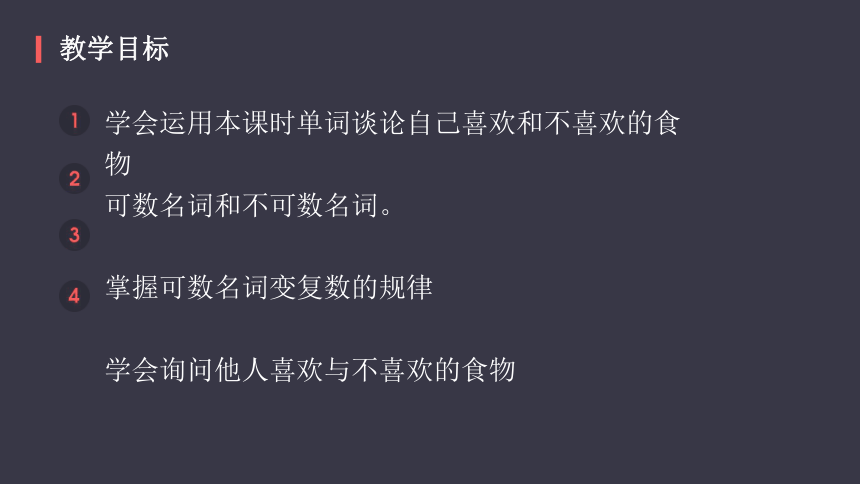
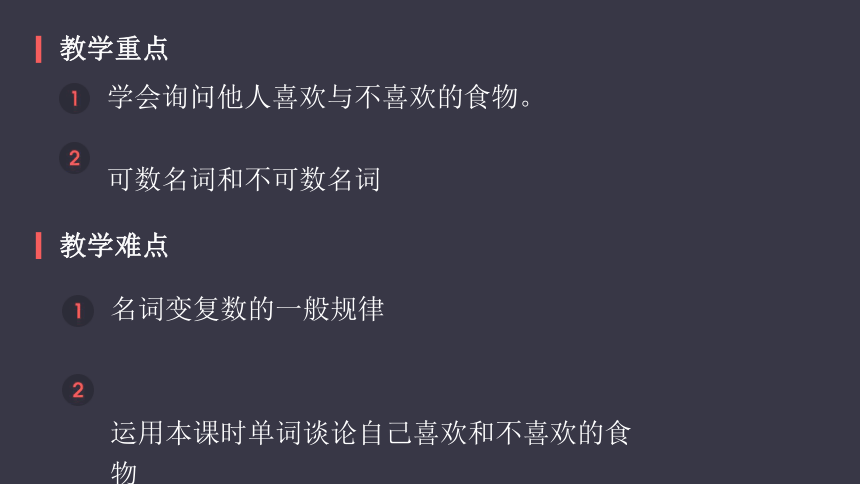

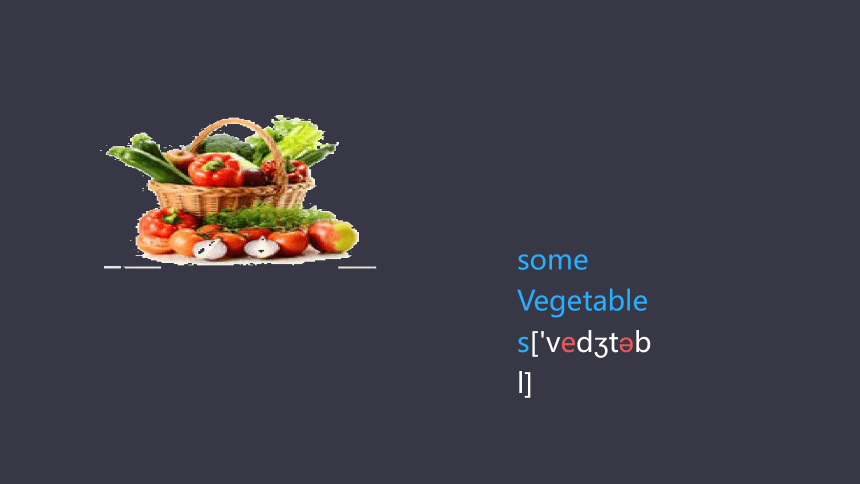
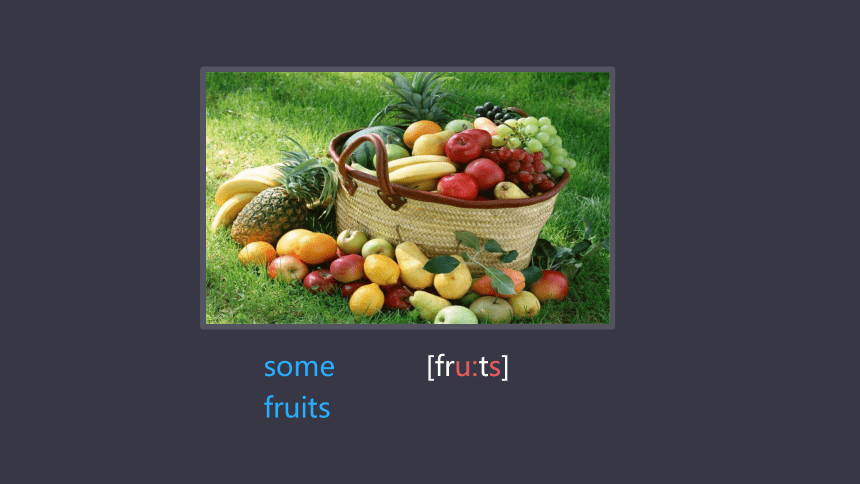
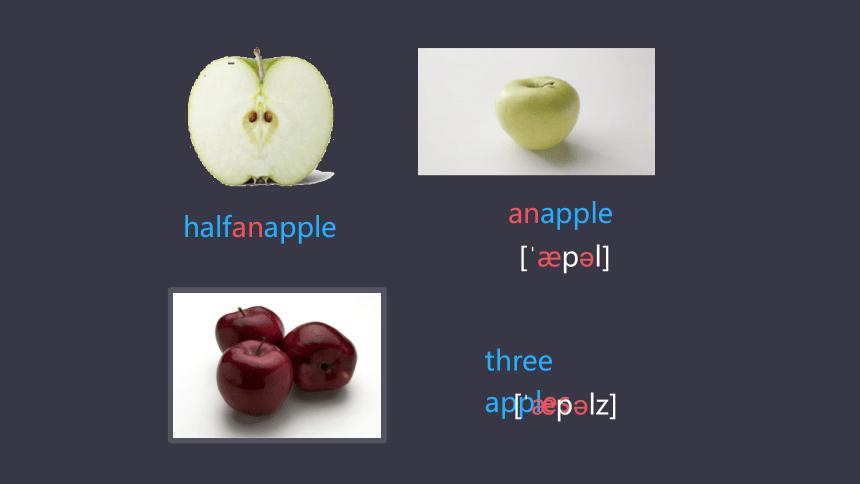
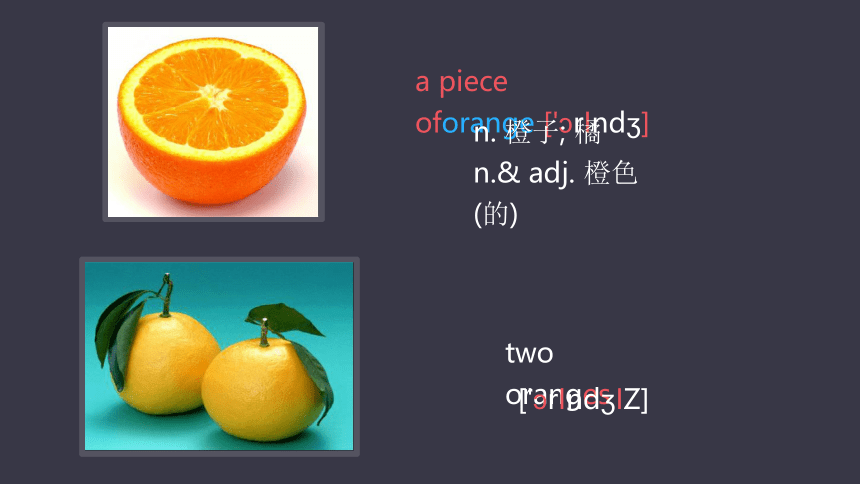
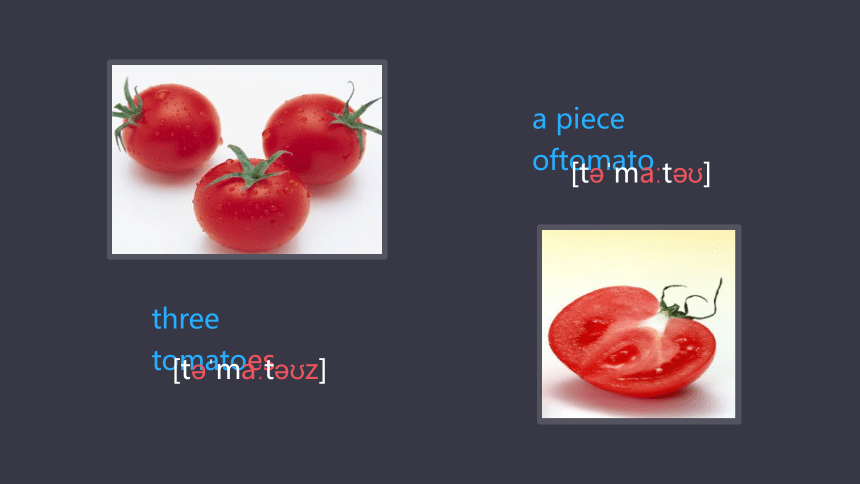
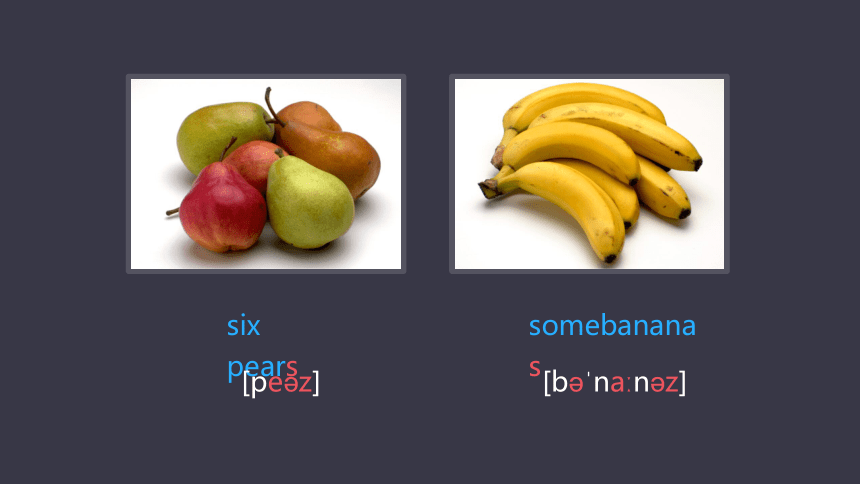
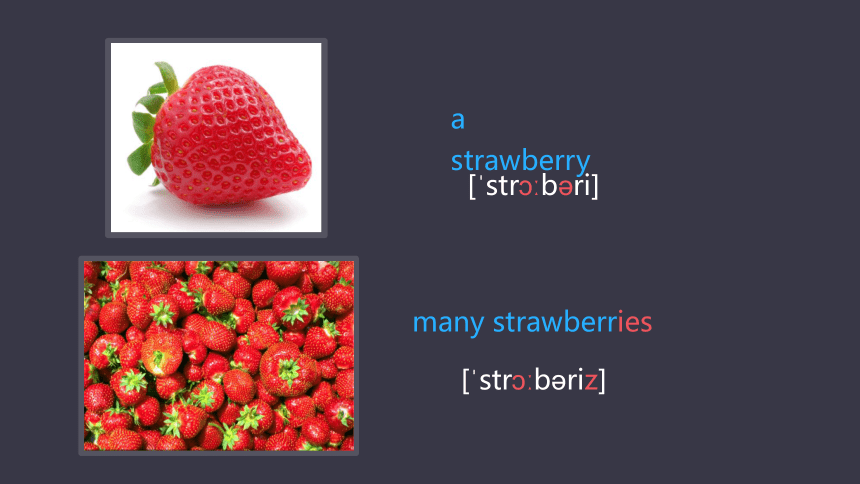
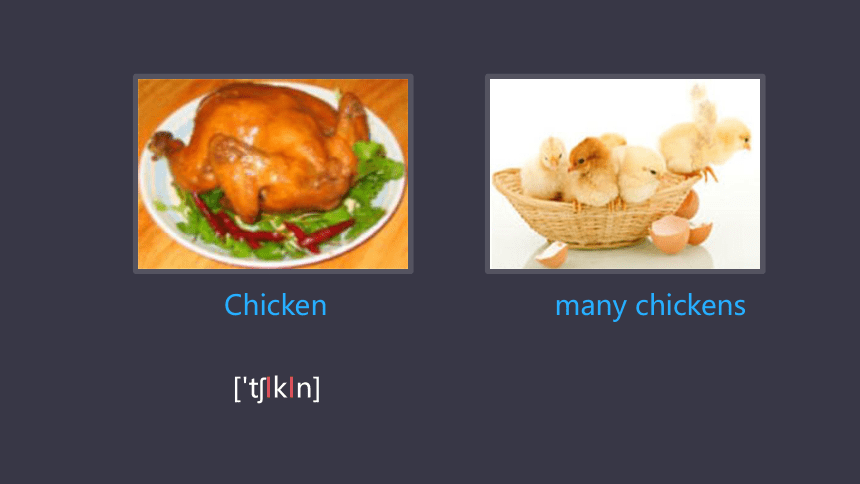
文档简介
(共121张PPT)
Do you like bananas?
教学目标
学会运用本课时单词谈论自己喜欢和不喜欢的食物
可数名词和不可数名词。
掌握可数名词变复数的规律
学会询问他人喜欢与不喜欢的食物
教学重点
教学难点
学会询问他人喜欢与不喜欢的食物。
可数名词和不可数名词
名词变复数的一般规律
运用本课时单词谈论自己喜欢和不喜欢的食物
This is a fridge (冰箱).
What’s in the fridge (猜猜冰箱里有什么 )
some
Vegetables['ved t bl]
some fruits
[fru:ts]
anapple
halfanapple
three apples
[ p l]
[ p lz]
a piece oforange [' rInd ]
n. 橙子; 橘
n.& adj. 橙色(的)
two oranges
[' rInd IZ]
a piece oftomato
three tomatoes
[t ma t ]
[t ma t z]
six pears
somebananas
[pe z]
[b na n z]
many strawberries
a strawberry
[ str b riz]
[ str b ri]
Chicken
['t IkIn]
many chickens
a carrot
some carrots
[ k r t]
potatoes
French fries
= potato chips[p 'teIt ] [t Ips]
two hamburgers
[ h mb g z] n.汉堡包
ice cream
[a s kri:m]
ice cream
[a s kri:m]
salad
[ s l d]n.沙拉
salad
[ s l d]n.沙拉
milk
[m lk]
milk
[m lk]
bread
[bred]
bread
[bred]
a bag of
[ra s]
可数名词
(countable noun)
apple —
pear —
hamburger —
banana —
orange —
strawberry —
tomato —
apples
pears
hamburgers
bananas
oranges
strawberries
tomatoes
可数名词
定义:是可以计数的名词。
可数名词前可以用a , an限定,表一个。
可数名词前可以用 one, two, three …等限定。
可数名词有复数形式。
可数名词复数形式的构成1
名词特点 词尾加法 词尾读音方法 例词
一般情况下
加-s
1. -s在清辅音后读[s]
2. -s在浊辅音后读[z]
3. -s在元音后读[z]
4. 以音素[ s , z , ] ]
结尾的,读[iz]
desks
apples
trees
oranges
以-s, -x, -sh,
-ch 结尾的
以f 或 fe
结尾的
加-es
改f或fe为
v 再加-es
-es读[iz]
-ves读[vz]
boxes
watches
knives
wives
可数名词复数形式的构成2
名词特点 词尾加法 词尾读音方法 例词
以辅音字母加
y结尾的
改y为i 再加-es
-ies读[iz]
-s读[z]
families
dictionaries
boys
keys
以元音字母加
y结尾的
以o 结尾的
加-s
有生命的事
物加-es
-es读[iz]
tomatoes
potatoes
photos
radios
无生命的事
物加-s
-s读[z]
不可数名词
(uncountable noun)
milk
Bread
rice
不可数名词
定义:是指表示不能计数的事物的名词。
不可数名词前不可以用 a , an 限定。
不可数名词前不可以用 one, two , three …等限定。
不可数名词没有复数形式。
既可数又不可数的名词
(countable and uncountable nouns)
ice cream
salad
food
fruit
chicken
既可数又不可数的名词
定义:在某些情况下能计数,在某些情况下不能计数的名词。
e.g. (1)a chicken一只鸡
chicken 鸡肉
(2)an ice cream一个冰淇淋
ice cream冰淇淋(指成份)
(3)a salad一碟沙拉
salad沙拉(指成份)
1aMatch the words with the things in the picture.
1aMatch the words with the things in the picture.
1. hamburgers ___ 2. tomatoes ____
3. oranges ___ 4. ice cream ___
5. salad ___ 6. bananas ___
7. strawberries ___ 8. pears___
9. milk ___ 10. bread ___
d
i
f
h
b
g
c
j
e
a
1bListen and number the conversations.
A: Do you like salad
B: No, I don’t.
A: Do you like bananas
B: Yes, I do.
A: Do you like oranges
B: Yes, I do.
1cPractice the conversations above with
your partner. Then make your own
conversations.
Do you like …
Yes, I do.
No, I don’t.
A: Do you likehamburgers
B: Yes, I do. / No, I don’t.
A: Do you likesalad
B: Yes, I do. / No, I don’t.
What’s your favorite food
Do you like …
I like
Idon’t like
2aListen and circle the food you hear.
hamburgers
pears
tomatoes
oranges
ice cream
salad
strawberries
bananas
2bListen again. Fill in the blanks.
tomatoes
ice cream
tomatoes
ice cream
2cPractice the conversations above.
2dRole-play the conversation.
Jack: Hey, John’s birthday dinner is next week. Let’s think about the food.
Tom: Sure. How about burgers, vegetable
salad, and some fruit
Bill: Sounds good. John likes hamburgers.
Jack: Oh, I don’t like salad.
Bill: But John likes salad, and it’s his
birthday.
Jack: Yes, you’re right. What about the fruit
Tom: I think John likes strawberries and apples.
Bill: OK. Let’s have strawberries and apples
then.
牛刀小试:
1.Don’t take the fruit to Alice. I need ______ (it).
2._____ (That) are my ________ (friend). ______ (It) are nice. 3.There are some ______ (photo) on the wall.
4.I have much ____________(homework) to do.
it
Those
friends
They
photos
homework
Let's chant
Do you like pears
Yes, I do. Yes, I do. I like pears.
Do I like bananas
No, you don’t. No, you don’t.
You don’t like bananas.
Milk, milk. He likesmilk.
Salad, salad. She doesn’t like salad.
3aUnderline the correct words in the brackets.
1.I like fruit, but I (don’t/ doesn’t ) like vegetables.
2.She (like/ likes) bread, but she (doesn’t/ don’t) like salad.
3. He (like/ likes) bananas, but he (don’t/ doesn’t) like oranges.
4. We (like/ likes) hamburgers, but we don’t (like/ likes) chicken.
5. They (likes/ like) pears, but they (don’t/ doesn’t) like strawberries.
I like .
I don’t like .
They like .
They don’t like .
tomatoes
strawberries
salad
milk
I likes .
He bread .
doesn’t like
hamburgers
She ice cream.She bananas.
doesn’t like
likes
Do you like strawberries
Yes,I do.
No,I don’t.
Do they like strawberries
Yes,they do.No,they don’t.
1.Do you like bananas 你喜欢香蕉吗?
Do you like… 是一个一般疑问句,它表示询问对方是否喜欢某物
其结构为:Do you like + 可数名词复数或不可数名词句中do是助动词,没有意义;回答时,肯定回答用do,否定回答用don’t。
Yes, I do. / No, I don’t .
是的, 我喜欢。/不, 我不喜欢。
2. 如果主语是第三人称单数形式,助动词用does,其句型为:
----Doeshe /she like…
----Yes, he/shedoes. / No, he/shedoesn’t.
例: Does he like strawberries
他喜欢草莓吗?
Yes, he does. / No, he doesn’t.
是的, 他喜欢。/不, 他不喜欢。
3bNumber these sentences [1-4] to make a conversations.
( ) So, let’s get salad.
( ) Yes, I do.
( ) Do you like salad
( ) OK.
A: Do you like bread
B: Yes, I do.
A: So, let’s get bread.
B: OK.
A: Do you like …
B: Yes, I do.
A: So, let’s get ….
B: OK.
Work in pairs
A:Doeshelike…
B: Yes, hedoes. He likes…
/No, hedoesn’t. Hedoesn’tlike …
A:DoesShelike…
B: Yes, shedoes. She likes…
/No, shedoesn’t. Shedoesn’tlike …
A: Dothey like…
B: Yes, theydo. they like …
/No, theydon’t. theydon’tlike …
— Does she / he like …
— Yes, she / he does. She / He likes …
No, she / he doesn’t. She / He doesn’t like …
food
person
Different people like different food. How about your classmate What does he / she like Interview each other, and make a survey.
3cFood Survey
Food Likes Doesn't like
ice-cream Liu Li Zhao Jun
New Words
star n.
eat v.
well adv.
habit n.
healthy adj.
really adv.
question n.
want v.
be v.
fat adj.
星星;明星
吃
好; 令人满意地
习惯
健康的
真正地
问题
需要;想要
变成
肥的;肥胖的
Do you like
broccoli
No, I don’t.
Does your sister
like carrot
Yes, she does.
Does your parents
like ice cream
No, they don’t.
拓展
Healthy food
broccoli
apple
carrots
fish
orange
Unhealthy food
junk food
hamburger
ice cream
French fries
Speak and write
Dear friend,
I have a happy family. I like ________ and
____________. But I don’t like _________.
My father likes_____________ and_________.
He doesn’t like _________. And my mother likes
_______ and______________. She doesn’t like
_______________ or ________.
How about you Please write to me soon.
Yours,
Tony
oranges
French fries
tomatoes
hamburgers
bananas
apples
broccoli
strawberries
ice-cream
pears
Does it like …
Itlikesbananas very much.
Itdoesn’t likepears or
potatoes.
Does it like …
Itlikesrice.
Itlikesfish very much.
Itdoesn’t likehamburgers.
hamburgers
rice
/ ra s/
fish(es)
/f ( z)/
Does it like …
carrots
/’k r ts/
milk
/ m lk/
chicken
/’ k n/
It likescarrotsvery much.
It doesn’tlike milkat all.
It doesn’t like chicken.
Does it like …
It likesmeatvery much.
It likeseggs.
But it doesn’t like bread.
meat
/ mi:t/
bread
/ bred/
eggs
/eg/
1aWrite the number of each word next to the correct food.
1. orange 2. salad 3. eggs 4. apple
5. ice-cream 6. hamburger 7. banana
8. chicken 9. rice 10. carrots
Fruit:_________________________________
Food:_________________________________
Vegetable:_____________________________
1bHow many other words can you add to the lists
Fruit:pear,
Vegetable:carrot,
1cListen and circle the food you hear in 1a
1. orange 2. salad 3. eggs 4. apple
5. ice-cream 6. hamburger 7. banana
8. chicken 9. rice 10. carrots
1d Listen again. Fill in the chart.
Likes Doesn’t like
Tom
Sally
carrots,
all vegetables
salad
salad
fruit
bananas
oranges
apples
ice-cream
apples
vegetables
1eAsk and answer questions about what Sally and Tom like and don’t like.
Does Tom like tomatoes
Yes, he does.
Does he / she like …
Yes, he / she does.
No, he / she doesn’t.
Look at the breakfast, lunch, and dinner in activity 1a. Are they Sally’s or Tom’s Write “S” or “T”.
breakfast __
lunch __
dinner __
S
T
T
Sally likes … for breakfast / lunch / dinner.
Tom likes … for breakfast / lunch / dinner.
morning
noon
evening
breakfast
/`brekf st/
lunch
/`lΛnt /
dinner
/`din /
What do you like for
breakfast
lunch
dinner
For
breakfast, I like …
lunch, I like …
dinner, I like …
Sally likeseggs, apples and bananas for breakfast.
Tom likes hamburgers, oranges and carrots for lunch.
Tom likes salad, chicken, and ice creamfor dinner.
He / She / It has …
He / She / It doesn’t have …
Survey
What does your friend like for breakfast / lunch / dinner
Report:xxx likes eggs and milk for breakfast.
Name breakfast lunch dinner
Make a menu of three meals for a western friend.
List
For breakfast:___
For lunch:______
For dinner:______
What do you eat every day
2aWhich food do you think is healthy Check (√) Yes, Maybe or No.
Food Yes Maybe Nofruit
vegetables
eggs
chicken
hamburgers
ice-cream
2bRead the magazine article and circle the food words.
Sports Star Eats Well!
David asks the volleyball star, Cindy Smith, about her eating habits.
David: Hello, Cindy. What do you like for breakfast
Cindy: I love fruit. I think it’s healthy.
David: OK. So what fruit do you like Do you like bananas
Cindy: Well, I don’t like bananas.
But I like oranges and apples.
David: What about lunch Do you like salad
Cindy: Yes, I really like it.
David: Hmm ... and do you like hamburgers for dinner
Cindy: Oh, no, they’re not healthy. I like chicken for dinner.
David: OK, well, one last question — do you eat
ice-cream after dinner
Cindy: Err ... I like ice-cream ...
but I don’t eat it. I don’t want to be fat.
2cWrite five sentences about Cindy’s eating habits.
Cindy likes healthy food.
1.Cindy _____________________________.
2.She _______________________________.
3.She _______________________________.
4.Cindy doesn’t ______________________.
5.She doesn’t _________________________.
3aComplete the survey for you and your partner.
Breakfast Lunch Dinner
I like
I don’t like
My partner
likes
My partner
doesn’t like
3bWrite about what you and your partner like and don’t like for breakfast.
For breakfast, I like ________________,but I don’t like ____________. And for lunch, I like__________________________________.
And for dinner, _________________. For breakfast, ________likes___________. For lunch, _____________________. And for dinner, _________________________.
这是一篇介绍某人一日三餐的短文,写作过程中应用如下句型:
1.For breakfast, I like …, but I don’t like … 早餐,我喜欢……,但我不喜欢……
2. I like … for breakfast/lunch/dinner.
早饭/午饭/晚饭我喜欢……
3. I don’t like … for breakfast/lunch/dinner. 早饭/午饭/晚饭我不喜欢……
4. He/ She likes …, but he/she doesn’t like ….
他/她喜欢……,但他/她不喜欢……
5. For breakfast/ lunch /dinner, he/she likes/ eats ….
就早饭/午饭/晚饭而言,他/她喜欢/吃……
6. He/ She doesn’t like … for breakfast/ lunch/ dinner.
早饭/午饭/晚饭他/她不喜欢……
One possible version: (According to 3a)
For breakfast, I like __________________________,
but I don’t like _____. For lunch, _________
______________________________________
__________________. And for dinner, _____
__________________________________________.
apples and hamburgers
milk
I like
chicken and I like vegetables and bread, but
I don’t like tomatoes
I like
chicken and rice, but I don’t like apples
he doesn’t like oranges
For breakfast, ______likes____________________. _____________________For lunch, ______________
____________________________________________.
And for dinner, _______________________
______________________________________
eggs and milk, but
he likes
he doesn’t like orange
hamburgers and salad, but he doesn’t like
he likes bananas, chicken
and bread, but he doesn’t like strawberries.
Mike
What food, sports and colors do you like and dislike
Food:
I like ______________________.
I don’t like _________________.
chicken, carrots
tomatoes
Food:
Food:
I like ______________________.
I don’t like _________________.
red and green
black
I like ______________________.
I don’t like _________________.
ping-pong and soccer
tennis
What food, sports and colors do your parents like and dislike Write at least five sentences.
这是写他人的个人爱好的句子。应注意人称和数的变化。当谈及父亲或母亲单个人称时,应用第三人称单数形式,常用句型:
1. My father/mother likes …
我爸爸/妈妈喜欢……
3. He/She likes …, but he/she doesn’t like …
他/她喜欢……,但他/她不喜欢……。
2. My father/mother doesn’t like …
我爸爸/妈妈不喜欢……
Food:
My father likes _____, but he doesn’t like _______.
My mother likes ______, but she doesn’t like ____.
另外,如果是两人同时喜欢或不喜欢什么用:
They like … 或 They don’t like …
他们(不)喜欢 ……
eggs
carrots
apples
rice
colors:
My father likes ____________________.
My mother likes _________.
They don’t like __________.
My father likes ____, but he doesn’t like ___.
My mother likes _____, but she doesn’t like _______.
basketball and soccer
tennis
ping-pong
blue
red
black
yellow
Sports:
牛刀小试:
按要求改写下列句子
1. They like bananas. (改为否定句)
They ______ ______ bananas.
2. I like to eat vegetables every day. (改为一般疑问句)
______ you like to ______ vegetables every day
don’t like
Do
eat
3. Tom likes apples.(改为一般疑问句)
______ Tom ______ apples
4. Does he like fried food (作肯定回答)
______, he ______.
5. Do they like hamburgers (作否定回答)
______, they ______.
Does like
Yes does
No don’t
牛刀小试:
1.Do you like hamburgers
Yes, ____ ____. But I _____ ______apples.
2. I’m Mary. I like ice cream. I don’t like salad.
— Hi, Mary. ________________________
— Yes, I do.
— Do you like salad
— ____________.
don’t
like
Do you like ice cream
No, I don’t
I
do
牛刀小试:
3. — Does Tom like broccoli
— _____, ____ _______. But Rose does.
4. My mother ______salad. But I don’t like. (like)
5. Do you like ______________ (strawberry)
6. She _______ like ice cream.
No
he
doesn’t
likes
strawberries
doesn’t
Self Check
1. Do you know the plurals of these words Put them in the correct columns.
hamburger tomato carrot photo banana strawberry hat table dictionary
egg apple pear radio vegetable family
pencil key volleyball
+s +es Y → i+ es
Self Check
2. What food / sports / colors do you like and dislike
I like …
I don’t like …
Self Check
3. What food, sports and colors do your parents like and dislike Write at least five sentences.
牛刀小试:
1.banana
2. hamburger
3.tomato
4. broccoli
5.French fries
6.orange
7. ice cream
8. salad
9.strawberry
草莓
香蕉
汉堡包
番茄;西红柿
花椰菜
薯条
冰淇淋
橘子
沙拉
牛刀小试:
将下面的名词按要求分类
dictionary, key, baseball, photo, bag, banana, tomato, broccoli, pear, chicken (鸡肉)
可数名词: ___________________________________________________
2. 不可数名词: _____________________________________________
dictionary; key; baseball; photo; bag; banana; tomato; pear
broccoli; chicken
牛刀小试:
按要求完成下列句子
1. Do they like hamburgers (作否定回答)
__________________________
2. My sister likes salad. (对画线部分提问)
__________________________
No, they don’t.
What does your sister like
牛刀小试:
3. I like French fries. (主语换成he)
__________________________
4. Mike likes broccoli. (改为一般疑问句)
__________________________
5. Sandra likes strawberries. (改为否定句)
__________________________
He likes French fries.
Does Mike like broccoli
Sandra doesn’t like strawberries.
牛刀小试:
根据句意,从括号中选择正确的单词填空
1.My grandparents ______ (like / likes) strawberries.
2. David _______ (don’t / doesn’t) play soccer.
3. Here _____ (is / are) some ice.
like
doesn’t
is
4. Where is the _______ (broccoli /oranges)
5. _____ (Do / Does) your sister _____ (like / likes) sports
6. These are two ___________ (hamburgers / broccoli).
broccoli
Does
like
hamburgers
牛刀小试:
连词成句
1. I, carrots, don’t, like
_________________________.
2. your, mother, does, apples, like
_______________________________________
3. my, egg, every, an, eats, morning, sister
_______________________________________.
I don’t like carrots.
Does your mother like apples
My sister eats an egg every morning
4. Lisa, does, what, eat, dessert, for
_____________________________________
5. doesn’t, John, vegetables, lunch, have, for
___________________________________________.
What does Lisa eat for dessert
John doesn’t have vegetables for lunch
牛刀小试:
A.
B.
C.
D.
【解答】
牛刀小试:
A.
B.
C.
D.
【解答】
A.
B.
C.
D.
【解答】
牛刀小试:
名词变复数
名词特点 词尾加法 词尾读音方法 例词
一般情况下
加-s
1. -s在清辅音后读[s]
2. -s在浊辅音后读[z]
3. -s在元音后读[z]
4. 以音素[ s , z , ] ]
结尾的,读[iz]
desks
apples
trees
oranges
以-s, -x, -sh,
-ch 结尾的
以f 或 fe
结尾的
加-es
改f或fe为
v 再加-es
-es读[iz]
-ves读[vz]
boxes
watches
knives
wives
名词特点 词尾加法 词尾读音方法 例词
以辅音字母加
y结尾的
改y为i 再加-es
-ies读[iz]
-s读[z]
families
dictionaries
boys
keys
以元音字母加
y结尾的
以o 结尾的
加-s
有生命的事
物加-es
-es读[iz]
tomatoes
potatoes
photos
radios
无生命的事
物加-s
-s读[z]
名词变复数
Do you like bananas?
教学目标
学会运用本课时单词谈论自己喜欢和不喜欢的食物
可数名词和不可数名词。
掌握可数名词变复数的规律
学会询问他人喜欢与不喜欢的食物
教学重点
教学难点
学会询问他人喜欢与不喜欢的食物。
可数名词和不可数名词
名词变复数的一般规律
运用本课时单词谈论自己喜欢和不喜欢的食物
This is a fridge (冰箱).
What’s in the fridge (猜猜冰箱里有什么 )
some
Vegetables['ved t bl]
some fruits
[fru:ts]
anapple
halfanapple
three apples
[ p l]
[ p lz]
a piece oforange [' rInd ]
n. 橙子; 橘
n.& adj. 橙色(的)
two oranges
[' rInd IZ]
a piece oftomato
three tomatoes
[t ma t ]
[t ma t z]
six pears
somebananas
[pe z]
[b na n z]
many strawberries
a strawberry
[ str b riz]
[ str b ri]
Chicken
['t IkIn]
many chickens
a carrot
some carrots
[ k r t]
potatoes
French fries
= potato chips[p 'teIt ] [t Ips]
two hamburgers
[ h mb g z] n.汉堡包
ice cream
[a s kri:m]
ice cream
[a s kri:m]
salad
[ s l d]n.沙拉
salad
[ s l d]n.沙拉
milk
[m lk]
milk
[m lk]
bread
[bred]
bread
[bred]
a bag of
[ra s]
可数名词
(countable noun)
apple —
pear —
hamburger —
banana —
orange —
strawberry —
tomato —
apples
pears
hamburgers
bananas
oranges
strawberries
tomatoes
可数名词
定义:是可以计数的名词。
可数名词前可以用a , an限定,表一个。
可数名词前可以用 one, two, three …等限定。
可数名词有复数形式。
可数名词复数形式的构成1
名词特点 词尾加法 词尾读音方法 例词
一般情况下
加-s
1. -s在清辅音后读[s]
2. -s在浊辅音后读[z]
3. -s在元音后读[z]
4. 以音素[ s , z , ] ]
结尾的,读[iz]
desks
apples
trees
oranges
以-s, -x, -sh,
-ch 结尾的
以f 或 fe
结尾的
加-es
改f或fe为
v 再加-es
-es读[iz]
-ves读[vz]
boxes
watches
knives
wives
可数名词复数形式的构成2
名词特点 词尾加法 词尾读音方法 例词
以辅音字母加
y结尾的
改y为i 再加-es
-ies读[iz]
-s读[z]
families
dictionaries
boys
keys
以元音字母加
y结尾的
以o 结尾的
加-s
有生命的事
物加-es
-es读[iz]
tomatoes
potatoes
photos
radios
无生命的事
物加-s
-s读[z]
不可数名词
(uncountable noun)
milk
Bread
rice
不可数名词
定义:是指表示不能计数的事物的名词。
不可数名词前不可以用 a , an 限定。
不可数名词前不可以用 one, two , three …等限定。
不可数名词没有复数形式。
既可数又不可数的名词
(countable and uncountable nouns)
ice cream
salad
food
fruit
chicken
既可数又不可数的名词
定义:在某些情况下能计数,在某些情况下不能计数的名词。
e.g. (1)a chicken一只鸡
chicken 鸡肉
(2)an ice cream一个冰淇淋
ice cream冰淇淋(指成份)
(3)a salad一碟沙拉
salad沙拉(指成份)
1aMatch the words with the things in the picture.
1aMatch the words with the things in the picture.
1. hamburgers ___ 2. tomatoes ____
3. oranges ___ 4. ice cream ___
5. salad ___ 6. bananas ___
7. strawberries ___ 8. pears___
9. milk ___ 10. bread ___
d
i
f
h
b
g
c
j
e
a
1bListen and number the conversations.
A: Do you like salad
B: No, I don’t.
A: Do you like bananas
B: Yes, I do.
A: Do you like oranges
B: Yes, I do.
1cPractice the conversations above with
your partner. Then make your own
conversations.
Do you like …
Yes, I do.
No, I don’t.
A: Do you likehamburgers
B: Yes, I do. / No, I don’t.
A: Do you likesalad
B: Yes, I do. / No, I don’t.
What’s your favorite food
Do you like …
I like
Idon’t like
2aListen and circle the food you hear.
hamburgers
pears
tomatoes
oranges
ice cream
salad
strawberries
bananas
2bListen again. Fill in the blanks.
tomatoes
ice cream
tomatoes
ice cream
2cPractice the conversations above.
2dRole-play the conversation.
Jack: Hey, John’s birthday dinner is next week. Let’s think about the food.
Tom: Sure. How about burgers, vegetable
salad, and some fruit
Bill: Sounds good. John likes hamburgers.
Jack: Oh, I don’t like salad.
Bill: But John likes salad, and it’s his
birthday.
Jack: Yes, you’re right. What about the fruit
Tom: I think John likes strawberries and apples.
Bill: OK. Let’s have strawberries and apples
then.
牛刀小试:
1.Don’t take the fruit to Alice. I need ______ (it).
2._____ (That) are my ________ (friend). ______ (It) are nice. 3.There are some ______ (photo) on the wall.
4.I have much ____________(homework) to do.
it
Those
friends
They
photos
homework
Let's chant
Do you like pears
Yes, I do. Yes, I do. I like pears.
Do I like bananas
No, you don’t. No, you don’t.
You don’t like bananas.
Milk, milk. He likesmilk.
Salad, salad. She doesn’t like salad.
3aUnderline the correct words in the brackets.
1.I like fruit, but I (don’t/ doesn’t ) like vegetables.
2.She (like/ likes) bread, but she (doesn’t/ don’t) like salad.
3. He (like/ likes) bananas, but he (don’t/ doesn’t) like oranges.
4. We (like/ likes) hamburgers, but we don’t (like/ likes) chicken.
5. They (likes/ like) pears, but they (don’t/ doesn’t) like strawberries.
I like .
I don’t like .
They like .
They don’t like .
tomatoes
strawberries
salad
milk
I likes .
He bread .
doesn’t like
hamburgers
She ice cream.She bananas.
doesn’t like
likes
Do you like strawberries
Yes,I do.
No,I don’t.
Do they like strawberries
Yes,they do.No,they don’t.
1.Do you like bananas 你喜欢香蕉吗?
Do you like… 是一个一般疑问句,它表示询问对方是否喜欢某物
其结构为:Do you like + 可数名词复数或不可数名词句中do是助动词,没有意义;回答时,肯定回答用do,否定回答用don’t。
Yes, I do. / No, I don’t .
是的, 我喜欢。/不, 我不喜欢。
2. 如果主语是第三人称单数形式,助动词用does,其句型为:
----Doeshe /she like…
----Yes, he/shedoes. / No, he/shedoesn’t.
例: Does he like strawberries
他喜欢草莓吗?
Yes, he does. / No, he doesn’t.
是的, 他喜欢。/不, 他不喜欢。
3bNumber these sentences [1-4] to make a conversations.
( ) So, let’s get salad.
( ) Yes, I do.
( ) Do you like salad
( ) OK.
A: Do you like bread
B: Yes, I do.
A: So, let’s get bread.
B: OK.
A: Do you like …
B: Yes, I do.
A: So, let’s get ….
B: OK.
Work in pairs
A:Doeshelike…
B: Yes, hedoes. He likes…
/No, hedoesn’t. Hedoesn’tlike …
A:DoesShelike…
B: Yes, shedoes. She likes…
/No, shedoesn’t. Shedoesn’tlike …
A: Dothey like…
B: Yes, theydo. they like …
/No, theydon’t. theydon’tlike …
— Does she / he like …
— Yes, she / he does. She / He likes …
No, she / he doesn’t. She / He doesn’t like …
food
person
Different people like different food. How about your classmate What does he / she like Interview each other, and make a survey.
3cFood Survey
Food Likes Doesn't like
ice-cream Liu Li Zhao Jun
New Words
star n.
eat v.
well adv.
habit n.
healthy adj.
really adv.
question n.
want v.
be v.
fat adj.
星星;明星
吃
好; 令人满意地
习惯
健康的
真正地
问题
需要;想要
变成
肥的;肥胖的
Do you like
broccoli
No, I don’t.
Does your sister
like carrot
Yes, she does.
Does your parents
like ice cream
No, they don’t.
拓展
Healthy food
broccoli
apple
carrots
fish
orange
Unhealthy food
junk food
hamburger
ice cream
French fries
Speak and write
Dear friend,
I have a happy family. I like ________ and
____________. But I don’t like _________.
My father likes_____________ and_________.
He doesn’t like _________. And my mother likes
_______ and______________. She doesn’t like
_______________ or ________.
How about you Please write to me soon.
Yours,
Tony
oranges
French fries
tomatoes
hamburgers
bananas
apples
broccoli
strawberries
ice-cream
pears
Does it like …
Itlikesbananas very much.
Itdoesn’t likepears or
potatoes.
Does it like …
Itlikesrice.
Itlikesfish very much.
Itdoesn’t likehamburgers.
hamburgers
rice
/ ra s/
fish(es)
/f ( z)/
Does it like …
carrots
/’k r ts/
milk
/ m lk/
chicken
/’ k n/
It likescarrotsvery much.
It doesn’tlike milkat all.
It doesn’t like chicken.
Does it like …
It likesmeatvery much.
It likeseggs.
But it doesn’t like bread.
meat
/ mi:t/
bread
/ bred/
eggs
/eg/
1aWrite the number of each word next to the correct food.
1. orange 2. salad 3. eggs 4. apple
5. ice-cream 6. hamburger 7. banana
8. chicken 9. rice 10. carrots
Fruit:_________________________________
Food:_________________________________
Vegetable:_____________________________
1bHow many other words can you add to the lists
Fruit:pear,
Vegetable:carrot,
1cListen and circle the food you hear in 1a
1. orange 2. salad 3. eggs 4. apple
5. ice-cream 6. hamburger 7. banana
8. chicken 9. rice 10. carrots
1d Listen again. Fill in the chart.
Likes Doesn’t like
Tom
Sally
carrots,
all vegetables
salad
salad
fruit
bananas
oranges
apples
ice-cream
apples
vegetables
1eAsk and answer questions about what Sally and Tom like and don’t like.
Does Tom like tomatoes
Yes, he does.
Does he / she like …
Yes, he / she does.
No, he / she doesn’t.
Look at the breakfast, lunch, and dinner in activity 1a. Are they Sally’s or Tom’s Write “S” or “T”.
breakfast __
lunch __
dinner __
S
T
T
Sally likes … for breakfast / lunch / dinner.
Tom likes … for breakfast / lunch / dinner.
morning
noon
evening
breakfast
/`brekf st/
lunch
/`lΛnt /
dinner
/`din /
What do you like for
breakfast
lunch
dinner
For
breakfast, I like …
lunch, I like …
dinner, I like …
Sally likeseggs, apples and bananas for breakfast.
Tom likes hamburgers, oranges and carrots for lunch.
Tom likes salad, chicken, and ice creamfor dinner.
He / She / It has …
He / She / It doesn’t have …
Survey
What does your friend like for breakfast / lunch / dinner
Report:xxx likes eggs and milk for breakfast.
Name breakfast lunch dinner
Make a menu of three meals for a western friend.
List
For breakfast:___
For lunch:______
For dinner:______
What do you eat every day
2aWhich food do you think is healthy Check (√) Yes, Maybe or No.
Food Yes Maybe Nofruit
vegetables
eggs
chicken
hamburgers
ice-cream
2bRead the magazine article and circle the food words.
Sports Star Eats Well!
David asks the volleyball star, Cindy Smith, about her eating habits.
David: Hello, Cindy. What do you like for breakfast
Cindy: I love fruit. I think it’s healthy.
David: OK. So what fruit do you like Do you like bananas
Cindy: Well, I don’t like bananas.
But I like oranges and apples.
David: What about lunch Do you like salad
Cindy: Yes, I really like it.
David: Hmm ... and do you like hamburgers for dinner
Cindy: Oh, no, they’re not healthy. I like chicken for dinner.
David: OK, well, one last question — do you eat
ice-cream after dinner
Cindy: Err ... I like ice-cream ...
but I don’t eat it. I don’t want to be fat.
2cWrite five sentences about Cindy’s eating habits.
Cindy likes healthy food.
1.Cindy _____________________________.
2.She _______________________________.
3.She _______________________________.
4.Cindy doesn’t ______________________.
5.She doesn’t _________________________.
3aComplete the survey for you and your partner.
Breakfast Lunch Dinner
I like
I don’t like
My partner
likes
My partner
doesn’t like
3bWrite about what you and your partner like and don’t like for breakfast.
For breakfast, I like ________________,but I don’t like ____________. And for lunch, I like__________________________________.
And for dinner, _________________. For breakfast, ________likes___________. For lunch, _____________________. And for dinner, _________________________.
这是一篇介绍某人一日三餐的短文,写作过程中应用如下句型:
1.For breakfast, I like …, but I don’t like … 早餐,我喜欢……,但我不喜欢……
2. I like … for breakfast/lunch/dinner.
早饭/午饭/晚饭我喜欢……
3. I don’t like … for breakfast/lunch/dinner. 早饭/午饭/晚饭我不喜欢……
4. He/ She likes …, but he/she doesn’t like ….
他/她喜欢……,但他/她不喜欢……
5. For breakfast/ lunch /dinner, he/she likes/ eats ….
就早饭/午饭/晚饭而言,他/她喜欢/吃……
6. He/ She doesn’t like … for breakfast/ lunch/ dinner.
早饭/午饭/晚饭他/她不喜欢……
One possible version: (According to 3a)
For breakfast, I like __________________________,
but I don’t like _____. For lunch, _________
______________________________________
__________________. And for dinner, _____
__________________________________________.
apples and hamburgers
milk
I like
chicken and I like vegetables and bread, but
I don’t like tomatoes
I like
chicken and rice, but I don’t like apples
he doesn’t like oranges
For breakfast, ______likes____________________. _____________________For lunch, ______________
____________________________________________.
And for dinner, _______________________
______________________________________
eggs and milk, but
he likes
he doesn’t like orange
hamburgers and salad, but he doesn’t like
he likes bananas, chicken
and bread, but he doesn’t like strawberries.
Mike
What food, sports and colors do you like and dislike
Food:
I like ______________________.
I don’t like _________________.
chicken, carrots
tomatoes
Food:
Food:
I like ______________________.
I don’t like _________________.
red and green
black
I like ______________________.
I don’t like _________________.
ping-pong and soccer
tennis
What food, sports and colors do your parents like and dislike Write at least five sentences.
这是写他人的个人爱好的句子。应注意人称和数的变化。当谈及父亲或母亲单个人称时,应用第三人称单数形式,常用句型:
1. My father/mother likes …
我爸爸/妈妈喜欢……
3. He/She likes …, but he/she doesn’t like …
他/她喜欢……,但他/她不喜欢……。
2. My father/mother doesn’t like …
我爸爸/妈妈不喜欢……
Food:
My father likes _____, but he doesn’t like _______.
My mother likes ______, but she doesn’t like ____.
另外,如果是两人同时喜欢或不喜欢什么用:
They like … 或 They don’t like …
他们(不)喜欢 ……
eggs
carrots
apples
rice
colors:
My father likes ____________________.
My mother likes _________.
They don’t like __________.
My father likes ____, but he doesn’t like ___.
My mother likes _____, but she doesn’t like _______.
basketball and soccer
tennis
ping-pong
blue
red
black
yellow
Sports:
牛刀小试:
按要求改写下列句子
1. They like bananas. (改为否定句)
They ______ ______ bananas.
2. I like to eat vegetables every day. (改为一般疑问句)
______ you like to ______ vegetables every day
don’t like
Do
eat
3. Tom likes apples.(改为一般疑问句)
______ Tom ______ apples
4. Does he like fried food (作肯定回答)
______, he ______.
5. Do they like hamburgers (作否定回答)
______, they ______.
Does like
Yes does
No don’t
牛刀小试:
1.Do you like hamburgers
Yes, ____ ____. But I _____ ______apples.
2. I’m Mary. I like ice cream. I don’t like salad.
— Hi, Mary. ________________________
— Yes, I do.
— Do you like salad
— ____________.
don’t
like
Do you like ice cream
No, I don’t
I
do
牛刀小试:
3. — Does Tom like broccoli
— _____, ____ _______. But Rose does.
4. My mother ______salad. But I don’t like. (like)
5. Do you like ______________ (strawberry)
6. She _______ like ice cream.
No
he
doesn’t
likes
strawberries
doesn’t
Self Check
1. Do you know the plurals of these words Put them in the correct columns.
hamburger tomato carrot photo banana strawberry hat table dictionary
egg apple pear radio vegetable family
pencil key volleyball
+s +es Y → i+ es
Self Check
2. What food / sports / colors do you like and dislike
I like …
I don’t like …
Self Check
3. What food, sports and colors do your parents like and dislike Write at least five sentences.
牛刀小试:
1.banana
2. hamburger
3.tomato
4. broccoli
5.French fries
6.orange
7. ice cream
8. salad
9.strawberry
草莓
香蕉
汉堡包
番茄;西红柿
花椰菜
薯条
冰淇淋
橘子
沙拉
牛刀小试:
将下面的名词按要求分类
dictionary, key, baseball, photo, bag, banana, tomato, broccoli, pear, chicken (鸡肉)
可数名词: ___________________________________________________
2. 不可数名词: _____________________________________________
dictionary; key; baseball; photo; bag; banana; tomato; pear
broccoli; chicken
牛刀小试:
按要求完成下列句子
1. Do they like hamburgers (作否定回答)
__________________________
2. My sister likes salad. (对画线部分提问)
__________________________
No, they don’t.
What does your sister like
牛刀小试:
3. I like French fries. (主语换成he)
__________________________
4. Mike likes broccoli. (改为一般疑问句)
__________________________
5. Sandra likes strawberries. (改为否定句)
__________________________
He likes French fries.
Does Mike like broccoli
Sandra doesn’t like strawberries.
牛刀小试:
根据句意,从括号中选择正确的单词填空
1.My grandparents ______ (like / likes) strawberries.
2. David _______ (don’t / doesn’t) play soccer.
3. Here _____ (is / are) some ice.
like
doesn’t
is
4. Where is the _______ (broccoli /oranges)
5. _____ (Do / Does) your sister _____ (like / likes) sports
6. These are two ___________ (hamburgers / broccoli).
broccoli
Does
like
hamburgers
牛刀小试:
连词成句
1. I, carrots, don’t, like
_________________________.
2. your, mother, does, apples, like
_______________________________________
3. my, egg, every, an, eats, morning, sister
_______________________________________.
I don’t like carrots.
Does your mother like apples
My sister eats an egg every morning
4. Lisa, does, what, eat, dessert, for
_____________________________________
5. doesn’t, John, vegetables, lunch, have, for
___________________________________________.
What does Lisa eat for dessert
John doesn’t have vegetables for lunch
牛刀小试:
A.
B.
C.
D.
【解答】
牛刀小试:
A.
B.
C.
D.
【解答】
A.
B.
C.
D.
【解答】
牛刀小试:
名词变复数
名词特点 词尾加法 词尾读音方法 例词
一般情况下
加-s
1. -s在清辅音后读[s]
2. -s在浊辅音后读[z]
3. -s在元音后读[z]
4. 以音素[ s , z , ] ]
结尾的,读[iz]
desks
apples
trees
oranges
以-s, -x, -sh,
-ch 结尾的
以f 或 fe
结尾的
加-es
改f或fe为
v 再加-es
-es读[iz]
-ves读[vz]
boxes
watches
knives
wives
名词特点 词尾加法 词尾读音方法 例词
以辅音字母加
y结尾的
改y为i 再加-es
-ies读[iz]
-s读[z]
families
dictionaries
boys
keys
以元音字母加
y结尾的
以o 结尾的
加-s
有生命的事
物加-es
-es读[iz]
tomatoes
potatoes
photos
radios
无生命的事
物加-s
-s读[z]
名词变复数
同课章节目录
- starters 预备篇(2012秋审查)
- Unit 1 Good morning !
- Unit 2 What’s this in English?
- Unit 3 What color is it ?
- Unit 1 My name's Gina.
- Section A
- Section B
- Unit 2 This is my sister.
- Section A
- Section B
- Unit 3 Is this your pencil?
- Section A
- Section B
- Unit 4 Where's my schoolbag?
- Section A
- Section B
- Unit 5 Do you have a soccer ball?
- Section A
- Section B
- Unit 6 Do you like bananas?
- Section A
- Section B
- Unit 7 How much are these socks?
- Section A
- Section B
- Unit 8 When is your birthday?
- Section A
- Section B
- Unit 9 My favorite subject is science.
- Section A
- Section B
